John Stallings
John Robert Stallings junior (born 1935 in Morrilton , Arkansas , † November 24, 2008 ) was an American mathematician who studied geometric topology and algebra .
Life
Stallings studied at Princeton University (one of his fellow students was John Milnor ) and received his doctorate there in 1959 under Ralph Fox ( Some Topological Proofs and Extensions of Grushko's Theorem ). He was a professor at Berkeley University . In 1961/62 and 1971 he was at the Institute for Advanced Study .
In 1960, independently of Stephen Smale , he proved the Poincaré conjecture for dimensions greater than 6. His proof was extended to dimensions 5 and 6 by Erik Christopher Zeeman in 1962 . Stallings also formulated purely algebraic (group-theoretical) conjectures that are equivalent to the Poincaré conjecture (as he proved with Jaco).
According to Stallings, the Poincaré conjecture is equivalent to the following theorem (conjecture from Stallings):
Be an orientable two-dimensional manifold ( surface ) by sex , and free groups of rank and a surjective homomorphism from the fundamental group on . Then there is a non-trivial element of the kernel of represented by a simple closed curve on .
In 1970 he received the Cole Prize in Algebra with Richard Swan for the proof that finitely generated free groups are characterized by the fact that they have cohomological dimension 1 (the Stallings or Stallings-Swan theorem ).
In 1970 he was invited speaker at the International Congress of Mathematicians in Nice ( Group theory and 3-manifolds ) and in 1962 in Stockholm ( Topological unknottedness of certain spheres ).
Fonts
- with Stephen M. Gersten: Combinatorial Group Theory and Topology. Princeton University Press 1987, ISBN 0-691-08409-2 .
- Group Theory and Three-dimensional Manifolds. Yale University Press 1971, ISBN 0-300-01397-3 .
- Topology of finite graphs , Inventiones Mathematicae, Volume 71, 1983, pp. 551-565
Web links
- John Stallings in the Mathematics Genealogy Project (English)
- Page at the University of Berkeley
- Homepage in Berkeley
- Kenneth Chang: John R. Stallings Jr., 73, California Mathematician, Is Dead. In: The New York Times , January 18, 2009.
- Calegari, Color Remembering John Stallings , Notices AMS, 2009, issue 11, PDF file
Remarks
- ↑ John Stallings: Polyhedral homotopy spheres . Bulletin American Mathematical Society, Vol. 66, 1960, pp. 485-488.
- ↑ Stallings reports on this in his article How not to prove the Poincaré conjecture on his homepage. In purely algebraic terms, this is the "Conjecture D."
- ↑ since the Poincaré conjecture has since been proven
- ↑ that is, without colons
- ^ John Stallings: On torsion-free groups with infinitely many ends . Annals of Mathematics, Vol. 88, 1968, pp. 312-334.
| personal data | |
|---|---|
| SURNAME | Stallings, John |
| ALTERNATIVE NAMES | Stallings, John Robert Junior (full name) |
| BRIEF DESCRIPTION | American mathematician |
| DATE OF BIRTH | 1935 |
| PLACE OF BIRTH | Morrilton , Arkansas |
| DATE OF DEATH | November 24, 2008 |








